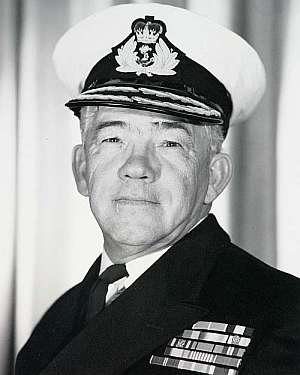- Author
- Howland, Tony
- Subjects
- Biographies and personal histories, Obituaries
- Tags
-
- RAN Ships
- None noted.
- Publication
- December 2007 edition of the Naval Historical Review (all rights reserved)
The death occurred on 4 October 2007 of Rear Admiral Bill Dovers. His contribution across so many areas of the Royal Australian Navy marked him out as not only a figure of major significance to the history and development of our service throughout his career, but also as one who gave real meaning to the description ‘larger than life’.
My personal experience of him was brief but had an immediate and major impact on me: he was the Captain of the Royal Australian Naval College when I joined that establishment in 1958 as a 15 year-old Cadet Midshipman. He was my first Captain, and so set a standard of dress, behaviour and management style which was to remain with me throughout my career. It would not be too much to say that he struck a degree of terror into the impressionable hearts of the 1958 Intermediate Entry.

The essential basics of his life and career alone make impressive reading. He was born 12 February, 1918 in Eastwood in Sydney, and educated at Wollongong and North Sydney High Schools. He entered the RAN College in 1932, and was awarded his Colours in cricket, Rugby Union, hockey and athletics. He was also awarded the Governor General’s Cup for Best All-Round Sportsman. He was promoted to Midshipman in 1936. During World War II, he served in HMA Ships Canberra, Napier, Nestor and Quickmatch, and in 1945 was promoted as the CO of HMAS Swan and Senior Officer of the Wewak Force. After the War, as a Lieutenant Commander he commanded HMA Ships Gladstone and Barcoo. He was promoted to Commander on 31 December, 1951 and after a stint in Navy Office as Director of Plans, he returned to sea for 18 months as the captain of HMAS Arunta. He then spent two and a half years in the UK, firstly undertaking the Naval Staff and Short Tactical Courses, and then as a member of the Directing Staff of the RN Staff College.
On his return to Australia, he was promoted to Captain and posted in command of the RAN College in January 1958, overseeing its move from Cerberus and re-establishment at Jervis Bay. He then took command of HMAS Voyager for a year. Late one night, in mid-Tasman, returning from a cruise to New Zealand, he received a lengthy signal from Navy Office asking if he would accept a posting to take command of the fledgling Royal Malayan Navy. His response was immediate and typically forthright. ‘Yes’, was his only reply. His impact on that service over the next two years was notable, particularly for the wisdom and energy he brought to an extremely sensitive political and diplomatic situation.
He returned to Australia to take command of HMAS Sydney. It was during his time in command that five young officers under training were tragically lost in a whaler accident in the Whitsunday Islands. The subsequent court martial found him guilty of neglect of duty ‘in failing to keep himself informed of the whaler’s progress.’
In view of his record and good character, he was given a reprimand. Typically, though obviously deeply disturbed by the incident, he was known to believe that the only way to meet a crisis like that is ‘to take your medicine and look to the future.’
Even as the Naval Board met to review the verdict, which was quashed, Captain Dovers was returning to the UK to attend the Imperial Defence College – a sure forerunner to further promotion.
On return again to Australia, he was posted in command to HMAS Supply for a year, before returning to Navy Office in Canberra, firstly as Deputy Chief of Naval Personnel and then as Acting Second Naval Member. He was promoted to Rear Admiral on 11 December, 1967 and confirmed in his posting as Second Naval Member. He moved in February, 1968 to Defence as the first Director of the Joint Staff, a position he held for three years.
It was during this period, on 1 January 1969, that he was awarded the CBE. The citation listed the major highlights of his career, and concluded ‘The award is in recognition of long, meritorious and devoted service in the Royal Australian Navy.’




